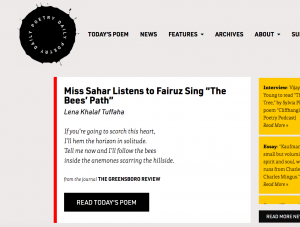Michael Pittard is a second-year MFA student at The University of North Carolina at Greensboro. His poems and reviews have appeared in such publications as Tupelo Quarterly and Red Flag Poetry. He lives in Greensboro with his cat, Roosevelt.
“‘Now the one thing you have to promise, Rudy, is that you never joke about this. Flying saucers are like religion. You’ve got to be solemn.’”
Evan Fackler: That’s from Thomas Disch’s “The Abduction of Bunny Steiner, or, A Shameless Lie,” a story about a writer cajoled into penning a fallacious UFO memoir that takes on a reality of its own. You’re an aficionado of alien abduction stories yourself—a curiosity you explore in your poetry. What’s the fascination there for you?
Michael Pittard: I’ve always been fascinated by the stories people tell themselves. People who think they have been abducted by aliens, people who believe in Bigfoot, people who think the world is flat; they all are trying to process information or events the best way they know how. My fascination comes from my desire to understand why these stories mean so much to them, why believing them and then being ostracized for that belief is worth it. In my poetry about aliens (or Bigfoot, or Flat Earth), I hope to open up space in a genre that sometimes tries to keep itself aloof and above “low-brow” culture for poems about topics that people didn’t know poetry is able to tackle. Plus, that tiniest possibility that it’s all true, that aliens exist, is impossible to resist. We all want the wildest stories to be real, so I hope to make them a little more real anyway I can.
EF: You’ve been thanked by writers on Twitter before for calling them to let them know their work has been accepted at The Greensboro Review. Mostly, of course, we’re used to receiving acceptances and rejections through email, our phone lines being primarily reserved for grandparents and scammers. Are people usually surprised to be talking to an editor on the phone in the middle of the day?
MP: People usually are! We don’t only reach out to people over the phone; it depends on the information they provide us and whether we think calling them over the phone will be the best way to reach them. But by even considering calling them separates The Greensboro Review from other journals. We do a mix of old and new here; we still take mailed submissions even though the bulk of what we read comes in through Submittable. It’s always great to talk to somebody where they can hear the inflections of your voice. It helps the editing process start off on the right foot. We all, as editors and poets, want what’s best for the poem, and establishing that trust is crucial in achieving that goal.
EF: You make it a point to visit used bookstores wherever you are. Any hidden gems out there book tourists should know about?
MP: Oh there are so many good used bookstores everywhere. Books wind up on those shelves that even the owners forget they have. I once visited the grave of the Venerable Bede in Durham, England. Bede, an 8th century monk, is considered to be the father of English history, and in a 3-story used book store in Durham (where the aisles were as narrow as possible) I found an old copy of Bede’s An Ecclesiastical History of the English People, and when I bought it the owner was astounded I had found it. As for stores in the US, I love McKay’s in Greensboro, which I have been visiting ever since I could read. I also discovered Bridge Street Books in DC, which has an amazing literary criticism and poetry section on its second floor.
EF: FAQ – To paraphrase Edwin Starr:
Cover letters, huh, yeah,
what are they good for?
Do you have any advice for those of us on the other side of the submission process who are maybe unsure of what our cover letters should be doing or saying?
MP: Cover letters are always hard to nail down, because the temptation is there to explain your work or justify it somehow. I’m not entirely against all attempts to make sure we as editors understand the context of your poems, but the more explanation you give, the more expectations I have of the work. And by expectations, I don’t mean higher standards, I just mean that I know something about the poems I didn’t know before, and it changes how I read them. I like it best when authors tell me the number of poems they are submitting, the titles, and a brief (like one sentence) description of the project, if there is one. But writers should trust their work to stand on its own! It usually does.
EF: Last question. 2018 was a weird year for poetry. On the one hand—and you’ve responded to this before—there’s been some noise that Instagram “saved” poetry (from what, it’s unclear). On the other hand, we’ve seen a lot more high-profile controversy swirling around the poetry community (events at The Nation early last Fall, for instance, or some fairly high profile discussions around plagiarism in “After” poems more recently). Putting aside any specific cases, why do you think poetry has become a locus for these discussions? What’s ahead for the poetry world in 2019?
MP: 2018 was definitely a weird year for poetry. I think I saw more articles stating that poetry is flourishing now more than ever, but the only justification for that headline was the increase in total book sales, not in the number of distinct books or poets. Still, an increase in book sales is always promising! We don’t have to save poetry from obscurity. People will always read poetry, but it is important that we direct people to new types and voices in poetry whenever we can. Even when someone recommends reading “classic poetry,” we do so to make sure the new poetry reader has the context to read what contemporary poets are reacting to or against. And we can’t be disdainful of where people start their poetry journey, or even of where they end it. Any poem has the potential to change someone’s life, even if it’s the only poem they ever read. It doesn’t matter if it’s “Instagram poetry” or John Ashbery.
As for why poetry becomes a locus for these discussions, I believe it’s because poetry is seen as both simple and complex at the same time. Poems are typically short, which means we’re supposed to get them much sooner than a novel. But schools also teach students that poems are also speaking in code to a different audience, and you won’t ever understand poems until you understand that code. It’s all hogwash, but it’s hogwash that plays on the poet’s desire to always be saying something important and deadly serious. Poetry as code is incredibly anti-egalitarian and elitist. Trust your first emotional response to a poem! But that desire to be meaningful gets in the way of letting other people speak too, which is a problem many areas of public life experience. Giving more people the chance to speak isn’t taking away your own right to speak. It just means you have to actually listen to them! I hope that this year in poetry is when poets and critics start to realize that more people writing all types of poetry is a great thing that portends an amazing future for the genre.

Evan Fackler is a fiction candidate in the MFA program at the University of North Carolina at Greensboro. You can find him on Twitter @evanchilli




